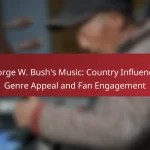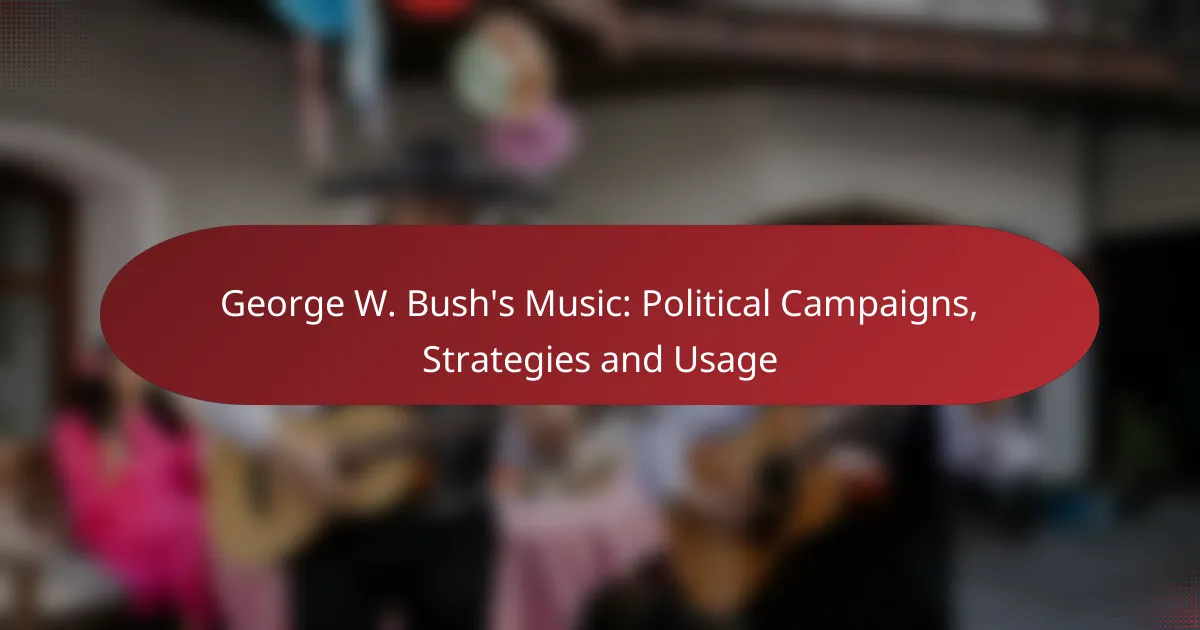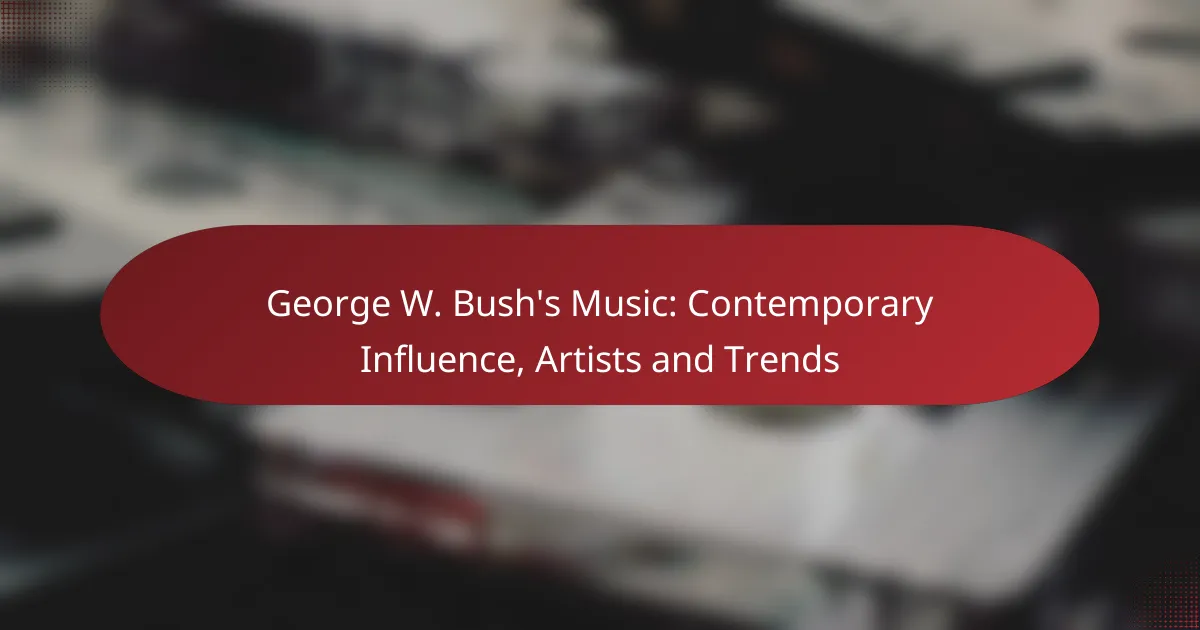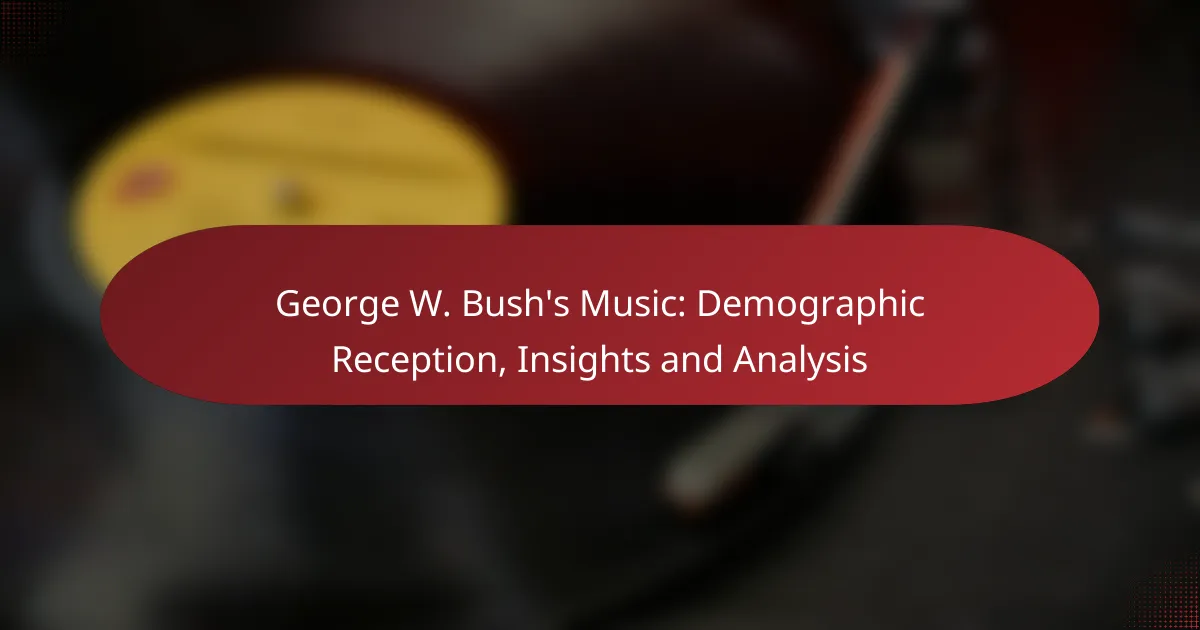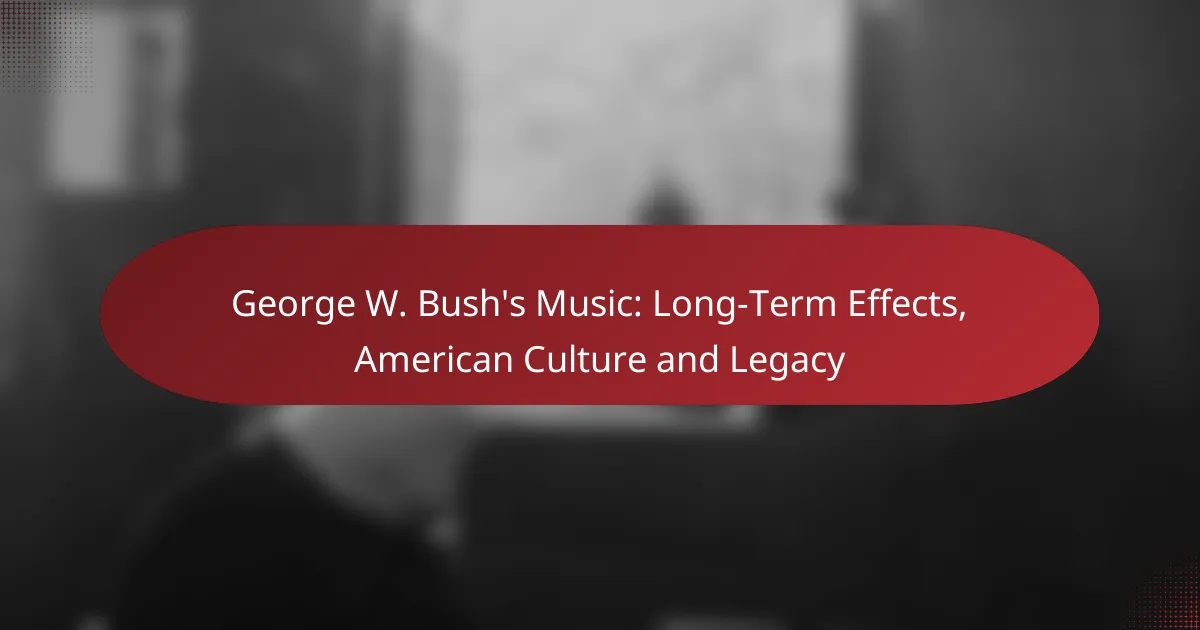George W. Bush’s music played a pivotal role in shaping political movements and conservative activism during his presidency. His selection of songs, often infused with themes of patriotism and national pride, resonated deeply with the public, especially in the aftermath of significant events like the September 11 attacks. Through strategic musical choices, Bush energized his supporters and reinforced his political messages, creating a lasting emotional connection with voters.
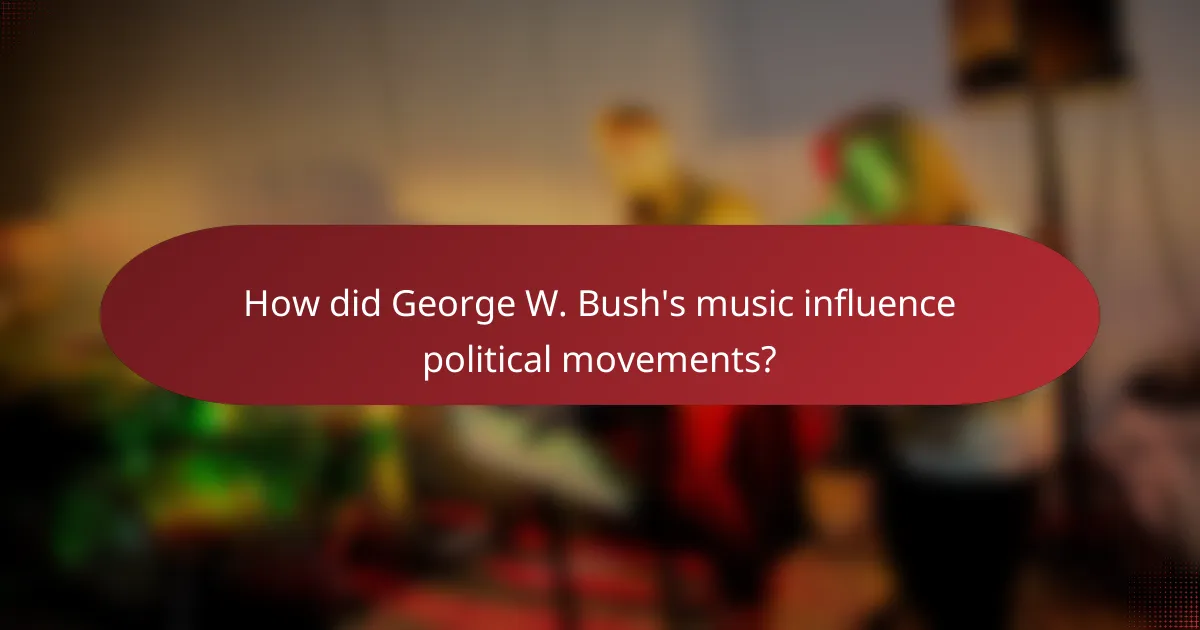
How did George W. Bush’s music influence political movements?
George W. Bush’s music significantly influenced political movements by serving as a rallying point for conservative activism and shaping public sentiment during his presidency. His musical choices often resonated with his political messages, reinforcing themes of patriotism and traditional values.
Impact on conservative activism
Bush’s music selections, including country and classic rock, became emblematic of conservative activism, appealing to a broad base of supporters. Songs like “God Bless the USA” by Lee Greenwood were frequently played at rallies, fostering a sense of unity and purpose among conservatives.
This musical backdrop helped galvanize grassroots movements, as supporters felt a deeper connection to the political messages conveyed through these songs. The combination of music and political rhetoric created an emotionally charged atmosphere that energized conservative activism.
Role in shaping public opinion
The music associated with Bush’s presidency played a crucial role in shaping public opinion, particularly in times of crisis. For instance, during the aftermath of the September 11 attacks, patriotic songs were prominently featured, reinforcing national unity and resilience.
These musical choices helped frame the narrative around his administration’s policies, making them more palatable to the public. By aligning his political agenda with popular music, Bush effectively influenced how citizens perceived key issues, including national security and foreign policy.
Connection to the War on Terror
Music during Bush’s presidency was closely tied to the War on Terror, with many songs reflecting themes of bravery and sacrifice. Tracks that celebrated American troops and their efforts abroad were frequently used in speeches and public events, reinforcing support for military action.
This connection between music and the War on Terror helped to legitimize the administration’s policies, as the emotional weight of the songs resonated with the public. By using music to evoke patriotism, Bush’s administration sought to unify the nation behind its military objectives and counter-terrorism strategies.
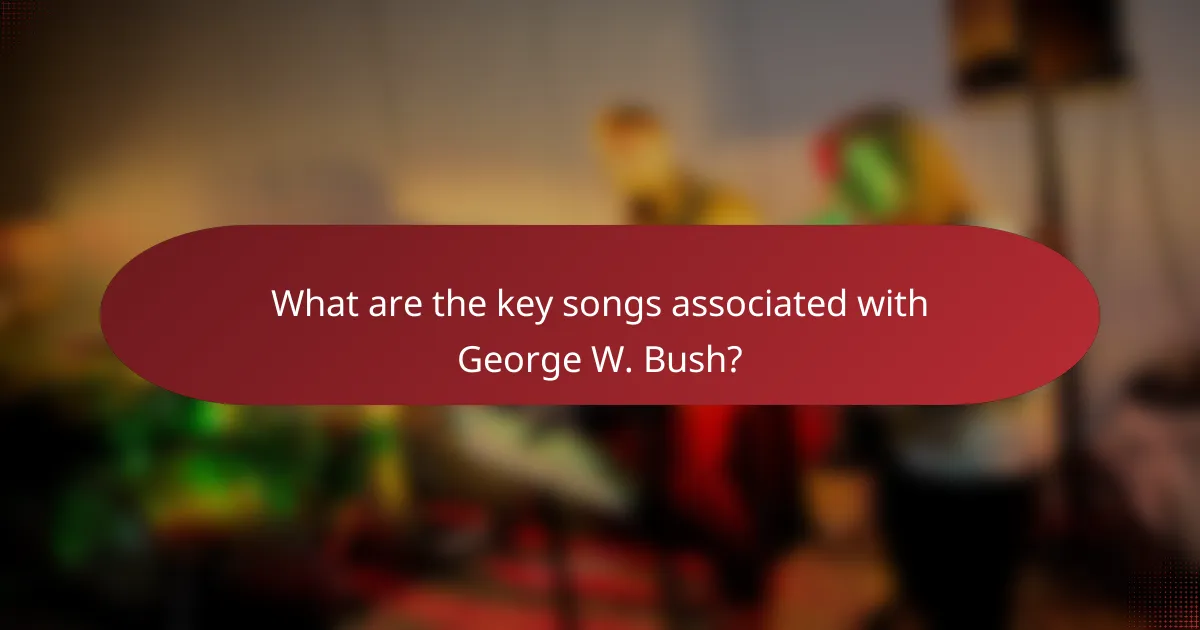
What are the key songs associated with George W. Bush?
Key songs associated with George W. Bush often reflect themes of patriotism and national pride, resonating with his presidency during significant events like the September 11 attacks. Notable tracks include “Courtesy of the Red, White and Blue” by Toby Keith and “God Bless the USA” by Lee Greenwood, both of which became anthems during his time in office.
“Courtesy of the Red, White and Blue” by Toby Keith
“Courtesy of the Red, White and Blue” emerged as a powerful anthem during George W. Bush’s presidency, particularly after the events of September 11, 2001. The song expresses a strong sense of American patriotism and resilience, capturing the national mood of defiance and unity.
The lyrics emphasize themes of strength and retribution, resonating with many Americans who sought to express their support for the military and the nation. Toby Keith’s performance of this song at various events further solidified its association with Bush’s administration and the broader political climate of the time.
“God Bless the USA” by Lee Greenwood
This song gained renewed popularity during Bush’s presidency, especially following national tragedies. Its uplifting message and emotional resonance made it a staple at rallies and commemorative events, reinforcing a sense of unity and national identity during challenging times.
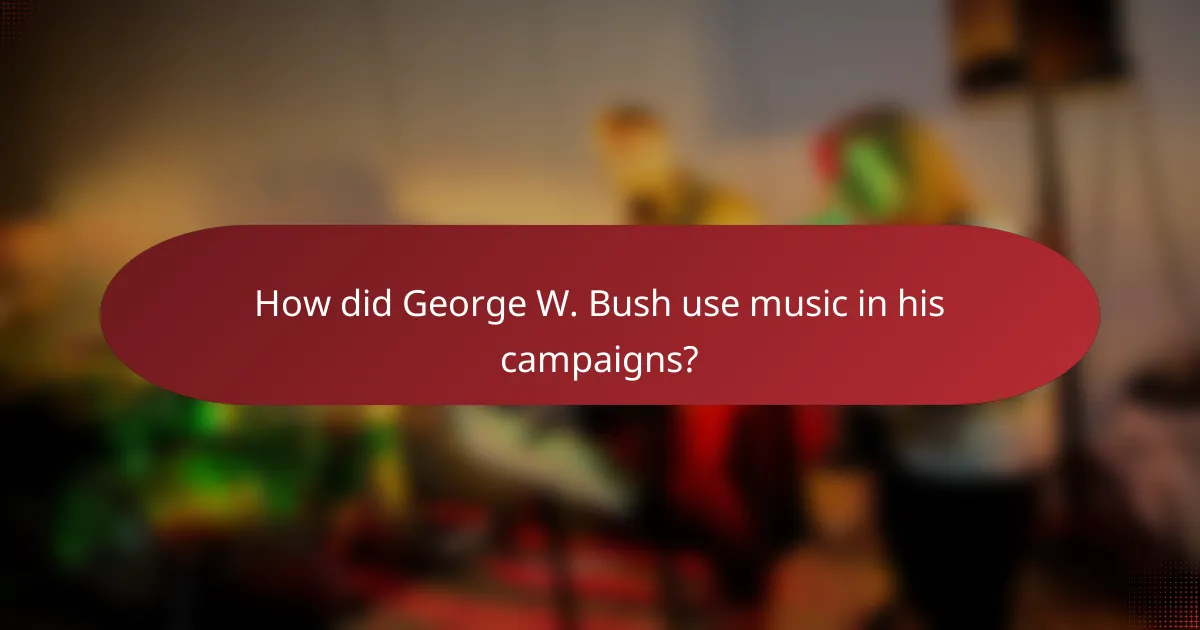
How did George W. Bush use music in his campaigns?
George W. Bush effectively used music as a strategic element in his campaigns to energize supporters and convey his political messages. By selecting specific songs and artists, he created an emotional connection with voters and reinforced his campaign themes.
Campaign rally anthems
During his campaigns, Bush often featured popular songs at rallies to create an upbeat atmosphere and rally support. Songs like “God Bless the USA” by Lee Greenwood became synonymous with his events, evoking feelings of patriotism and unity among attendees.
The choice of anthems was deliberate, aiming to resonate with core Republican values and appeal to a broad audience. This approach helped solidify his image as a leader who embodies American ideals, particularly during pivotal moments like the post-9/11 era.
Music as a tool for voter engagement
Music played a crucial role in engaging voters, particularly younger demographics. By incorporating contemporary artists and popular tracks, Bush’s campaign aimed to attract a diverse group of supporters and foster a sense of community among attendees.
Additionally, the use of music in advertisements and social media campaigns helped amplify his message and reach potential voters in a more relatable way. This strategy not only increased visibility but also encouraged participation in campaign events, ultimately influencing voter turnout.
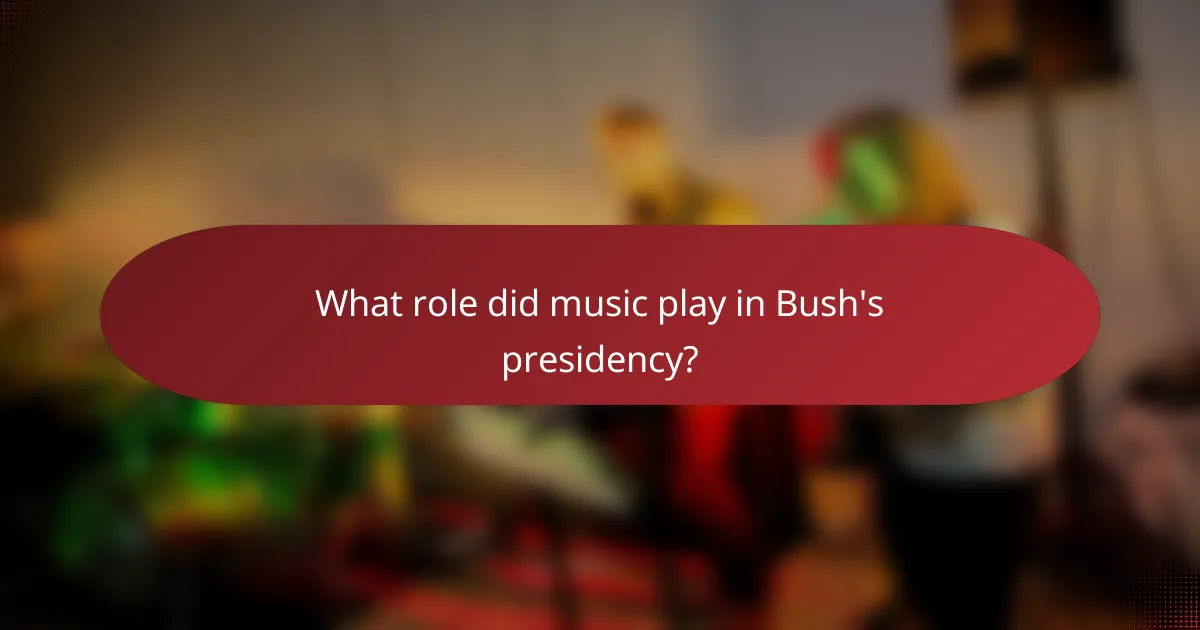
What role did music play in Bush’s presidency?
Music played a significant role in George W. Bush’s presidency by serving as a backdrop to national events and enhancing the emotional impact of his major speeches. It helped shape public sentiment and provided a cultural context for his administration’s policies and actions.
Soundtrack of national events
During George W. Bush’s presidency, music was often used to mark significant national events, such as memorials and celebrations. For instance, songs like “God Bless the U.S.A.” by Lee Greenwood became emblematic during times of national crisis, particularly after the September 11 attacks.
Additionally, events like the inauguration ceremonies featured performances by popular artists, which helped to create a sense of unity and patriotism. These musical choices often reflected the administration’s values and aimed to resonate with the American public.
Music during major speeches
Music played a crucial role in enhancing the emotional resonance of George W. Bush’s major speeches. For example, the use of “The Star-Spangled Banner” and other patriotic songs during key addresses aimed to evoke feelings of national pride and solidarity.
Moreover, the selection of music before and after speeches often set the tone for the message being delivered. Careful curation of songs helped to reinforce Bush’s themes, whether it was promoting freedom or commemorating sacrifices made by service members.
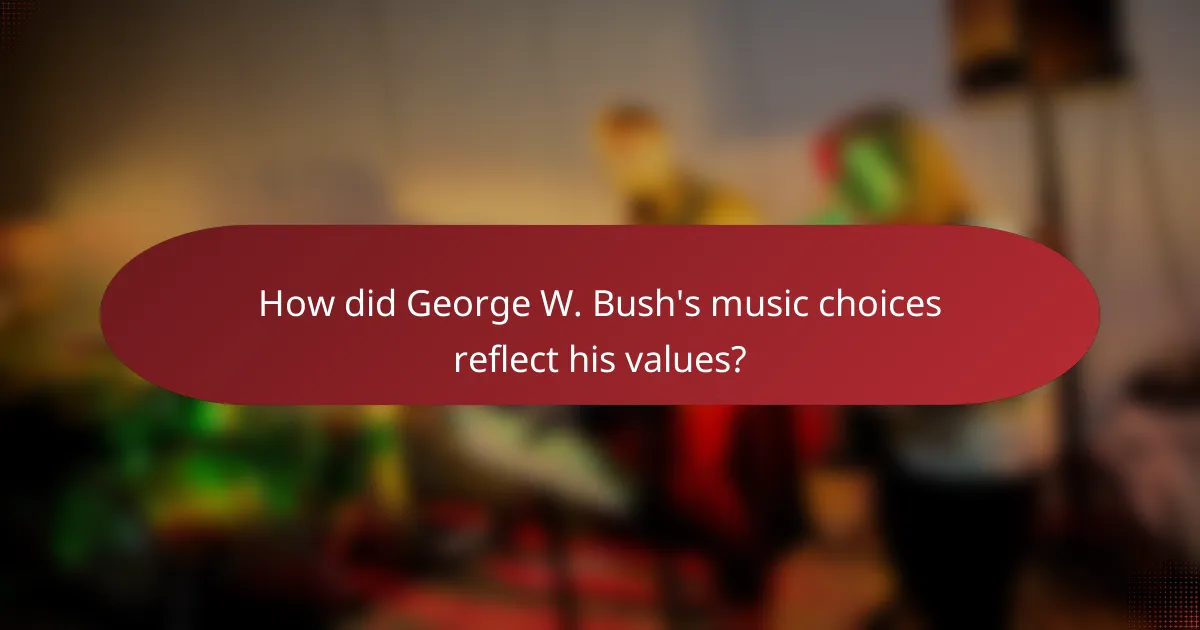
How did George W. Bush’s music choices reflect his values?
George W. Bush’s music selections often mirrored his values, emphasizing themes of patriotism, American identity, and traditionalism. His choices were not just personal preferences but also reflections of the political climate and cultural sentiments during his presidency.
Patriotism in song selection
Bush frequently chose songs that resonated with national pride and unity. Tracks like “God Bless the U.S.A.” by Lee Greenwood became anthems during his administration, especially in the wake of the September 11 attacks. These selections reinforced a sense of solidarity and resilience among Americans.
Additionally, his use of music at public events often included military and folk songs that celebrated American heroes and values. This not only appealed to his base but also sought to inspire a collective spirit among citizens.
Connection to American traditions
Bush’s music choices highlighted a deep connection to American traditions, often incorporating country music and classic rock that reflect the heartland values he championed. Artists like Toby Keith and Alan Jackson were frequently featured, aligning with his image as a president who valued rural and working-class Americans.
By embracing these genres, Bush aimed to evoke nostalgia and a sense of belonging, reinforcing the idea that his administration was in touch with the everyday lives of many Americans. This connection helped solidify his appeal among traditional voters and fostered a cultural identity linked to his presidency.
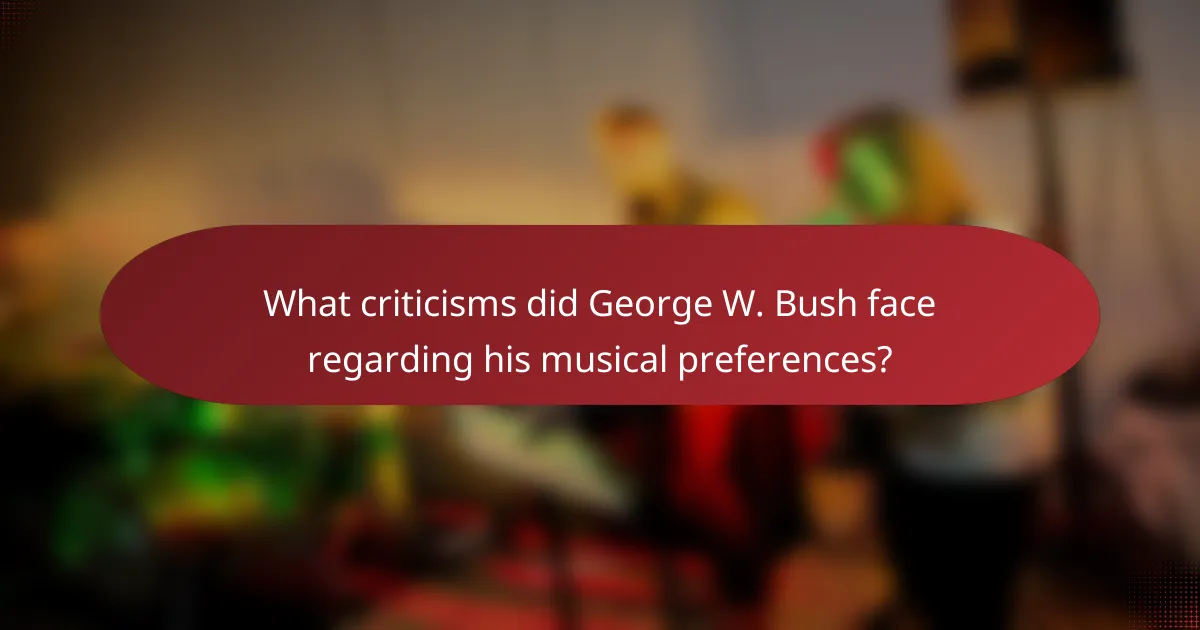
What criticisms did George W. Bush face regarding his musical preferences?
George W. Bush faced various criticisms related to his musical preferences, particularly concerning his choice of artists and the messages conveyed through their music. Critics often highlighted perceived cultural insensitivity and the disconnect between his political actions and the values expressed in the music he enjoyed.
Accusations of cultural insensitivity
Bush’s musical tastes sometimes drew accusations of cultural insensitivity, especially when he favored artists whose lyrics or themes contradicted his administration’s policies. For instance, his enjoyment of country music was scrutinized in light of the genre’s roots in working-class struggles, which some felt clashed with his political stance.
Additionally, his use of music from various cultures during public events raised eyebrows. Critics argued that while he showcased diverse musical styles, it often felt superficial and disconnected from genuine cultural appreciation.
Reactions from the music industry
The music industry had mixed reactions to Bush’s musical preferences, with some artists openly criticizing him while others supported his choices. Prominent musicians like Bruce Springsteen and Pearl Jam voiced their discontent with his policies, often using their platforms to challenge his administration.
Conversely, some country artists embraced Bush, aligning their music with his values and political messages. This division highlighted the broader cultural rift within the industry, reflecting the varying perspectives on political engagement through music.
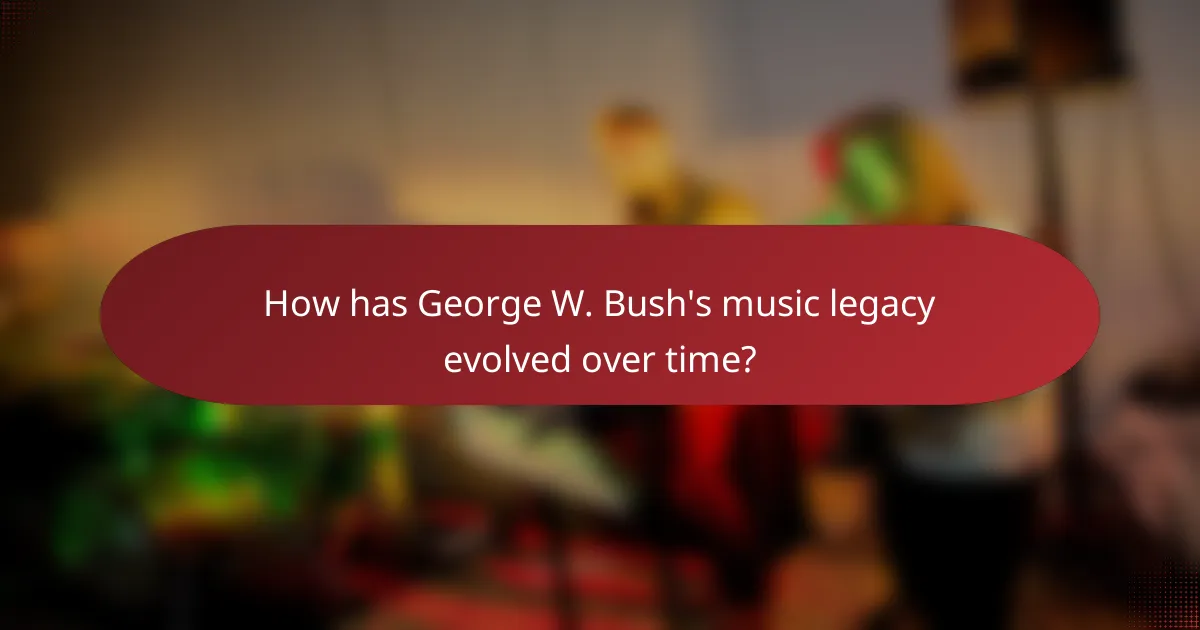
How has George W. Bush’s music legacy evolved over time?
George W. Bush’s music legacy has transformed significantly since his presidency, reflecting shifts in political sentiment and cultural interpretation. Initially tied closely to his administration’s values, his musical influence has since been reinterpreted by various artists and has impacted the political landscape.
Reinterpretation by artists
Many artists have drawn inspiration from George W. Bush’s presidency, using music to critique or support his policies. For instance, songs from genres like rock and hip-hop often incorporate themes related to his administration’s decisions, such as the Iraq War and economic policies. This reinterpretation serves as a form of political commentary, allowing artists to express dissent or approval through their work.
Notable examples include tracks that directly reference Bush’s speeches or decisions, often employing satire or irony. This artistic response highlights how music can serve as a powerful medium for political expression, shaping public perception and dialogue around his legacy.
Influence on subsequent political figures
George W. Bush’s music legacy has influenced how subsequent political figures engage with music as a tool for connection and messaging. Many politicians have adopted musical elements in their campaigns, recognizing the emotional resonance that music can create with voters. This trend reflects an understanding that music can enhance a political narrative and foster a sense of community among supporters.
For instance, contemporary politicians often curate playlists or use specific songs during rallies to evoke particular sentiments. This practice underscores the ongoing relevance of music in political strategy, as it can significantly impact voter engagement and public perception.
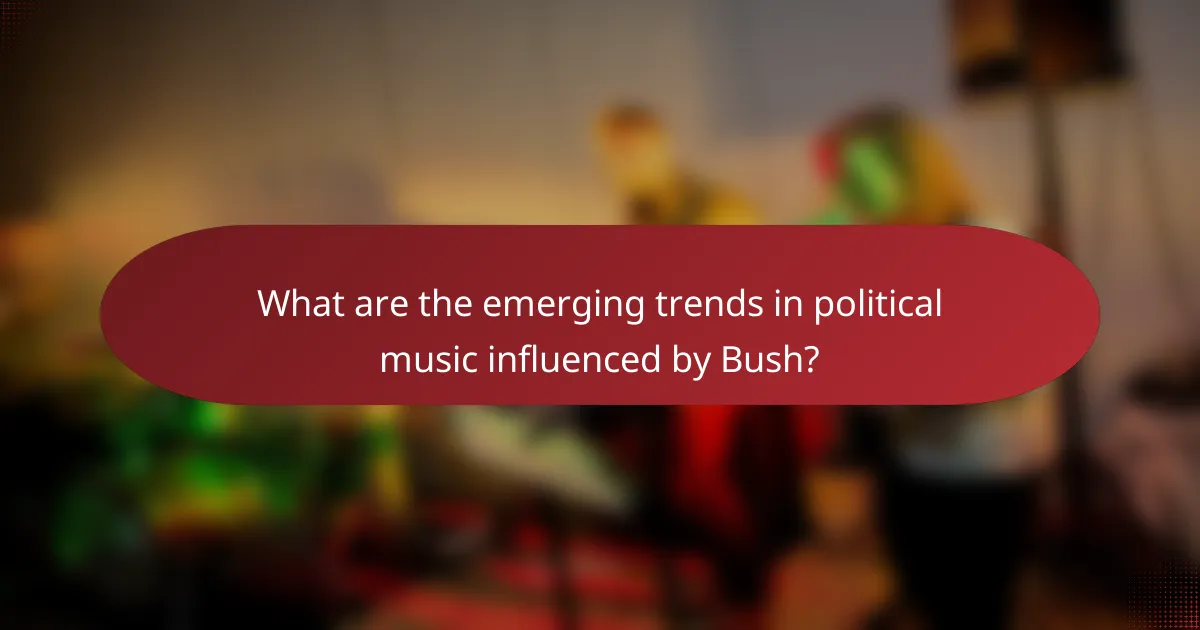
What are the emerging trends in political music influenced by Bush?
Emerging trends in political music influenced by George W. Bush reflect a resurgence of protest and activism through music, often addressing contemporary social issues. Artists are increasingly using their platforms to comment on political events, mobilize listeners, and inspire action.
Rise of protest music in modern politics
The rise of protest music in modern politics has been marked by a significant increase in songs addressing social justice, war, and government accountability. Artists, particularly in genres like hip-hop, folk, and rock, are leveraging their music to voice dissent and rally support for various causes.
Many contemporary musicians draw inspiration from the political climate during Bush’s presidency, using their lyrics to critique policies and advocate for change. This trend is evident in the works of artists like Green Day and Eminem, who have produced songs that resonate with listeners seeking to challenge the status quo.
To effectively engage with protest music, listeners can explore playlists that highlight current political themes, attend live performances that promote activism, and support artists who align with their values. Engaging with this music can foster a sense of community and encourage collective action among fans.



